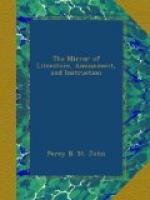First Landing of the Turks in Europe.—Orchanes, second king of the Turks, having settled his monarchy in Lesser Asia, was determined to get footing in Europe. Solyman, his eldest son, being willing to undertake the enterprise, was accordingly despatched with an army of veterans, who crossed the Hellespont, and arrived on the European side. They soon afterwards seized many considerable castles and cities belonging to the Greeks, who offered little or no resistance to the invaders of their empire. These occurrences transpired about the year 1358.
A Woman’s Revenge.—Mahomet the Great, on being proclaimed Sultan, caused his two innocent brothers to be put to death; the mother of the youngest immediately afterwards went to the new king, and reproached him severely for his cruelty. In order to appease her, he said, “that it consisted with the policy of his state to do as he had done, but that whatever she asked of him should be granted her.” The lady, therefore, determining to be revenged, demanded one of the sultan’s chief bassas to be delivered to her. Mahomet, to keep his word, gave orders that it should be done without delay; and the enraged lady, seeing the bassa bound before her, first stabbed him, and then plucked out his liver, which she cast to the dogs.
Turkish Superstition.—Scanderbeg, prince of Epyrus, after many glorious victories, died on the 17th of January, 1466, in the 53rd year of his age, and 24th of his reign. He was buried with great solemnity in the cathedral at Lyssa. The Turks, nine years afterwards, took the city, and dug up his bones for the purpose of setting them in rings and bracelets, thinking, by this means, that they should partake of his invincible fortune.
Amurath’s Dream.—About the year 1594, Amurath III. dreamed that he saw a man of prodigious stature, with one foot raised upon the Tower of Constantinople, while the other reached over the Bosphorus, and rested on the Asiatic shore. In one hand, the figure sustained the sun, while the other held the moon. He struck his foot against the Tower of Constantinople, the fall of which overthrew the great temple, and the imperial palace. Amurath, being greatly discomfited by this dream, consulted his wizard, who informed him, “that it was a warning sent by their prophet Mahomet, who threatened the overthrow of their religion and empire, unless Amurath engaged his whole force against the Christians.” This interpretation had so much influence with the emperor, that he vowed not to lay down his arms until he had utterly exterminated the Christians.
G.W.N.
* * * * *
TROUT FISHING.
(To the Editor of the Mirror.)
Sir,—I shall now sum up this ticklish subject, by acquainting you with three more methods of catching trout in Westmoreland.
Flood-netting.—A flood net is a small net with a semi-circular frame at the mouth of it, from which projects a long handle. This is used only when there are floods; the fisher draws it up the rivulets, and every now and then pulls it up to look for his success. Sometimes he nets a great many at a time, and especially if he wait the arrival of the flood, because a large shoal mostly comes down with the first torrents.




